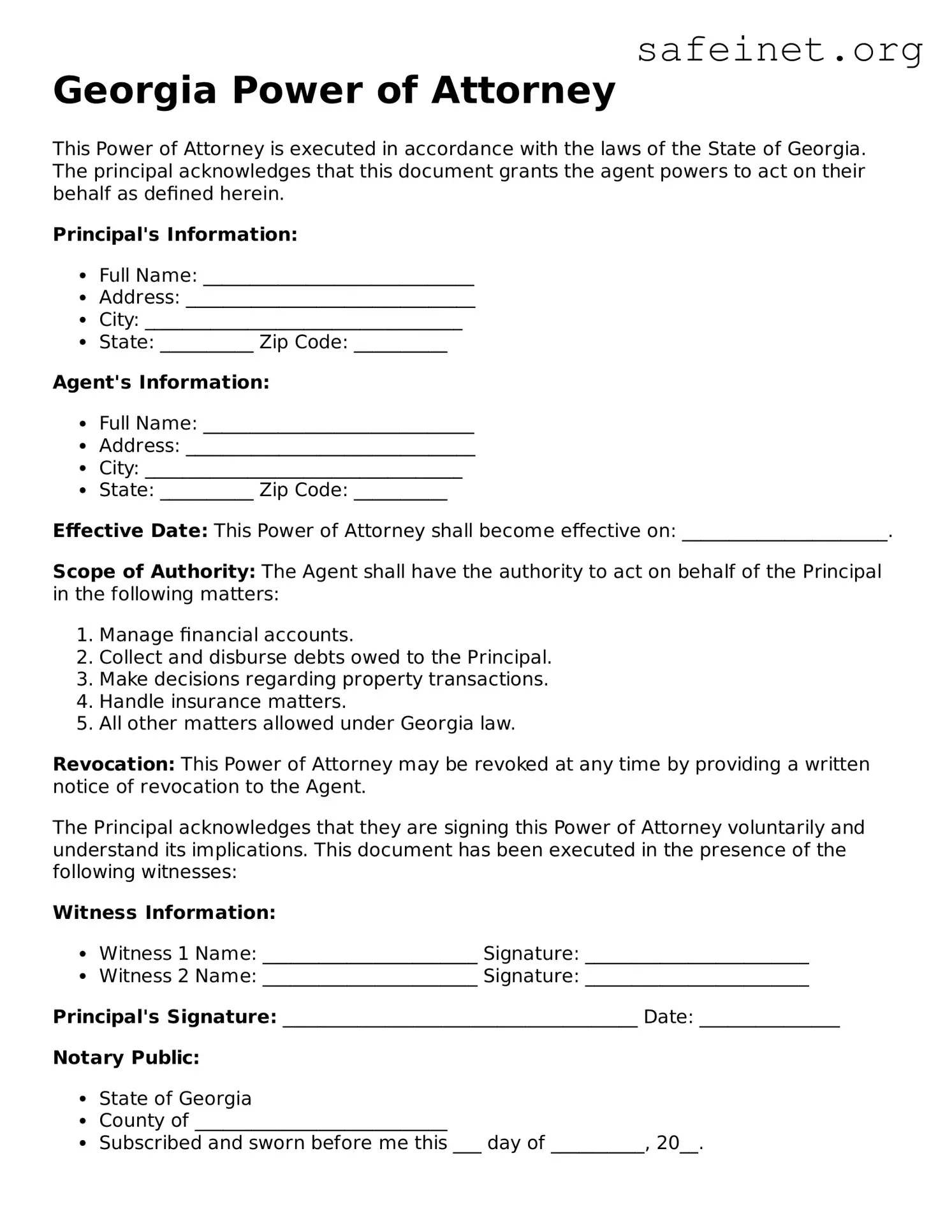A General Power of Attorney is similar to the Georgia Power of Attorney form in that it grants someone the authority to act on another person's behalf. This document is broad in scope, allowing the designated agent to make financial and legal decisions, similar to what the Georgia Power of Attorney enables. Both forms can cover a wide range of situations, such as managing bank accounts, paying bills, or signing legal documents, thus providing flexibility in how responsibilities are managed when a person is unable to do so themselves.
A Medical Power of Attorney specifically deals with health care decisions. Like the Georgia Power of Attorney, which can encompass medical decisions if explicitly stated, this document allows an individual to designate someone to make medical choices in case they are incapacitated. This form ensures that a person's health care preferences are honored even when they cannot communicate them directly, paralleling the authority granted in the Georgia Power of Attorney under medical circumstances.
The Durable Power of Attorney stands out for its emphasis on longevity. It continues to be effective even when the principal becomes incapacitated, similar to provisions in the Georgia Power of Attorney. This structure offers reassurance that the appointed agent maintains their authority to manage affairs no matter the principal's health status, ensuring that there is always someone empowered to handle critical decisions.
The Springing Power of Attorney takes on a unique feature by becoming effective only upon a specific event, such as incapacitation. This document aligns with the Georgia Power of Attorney concept, providing clarity and control over when the agent's authority begins. By defining the triggering condition, individuals can safeguard their interests and guarantee that their agent steps in only when truly necessary.
A Limited Power of Attorney is focused and specific. It grants authority for a particular purpose or a defined period, unlike the broader scope of Georgia’s Power of Attorney. Individuals may use this document for specific transactions, such as selling property or managing a particular investment. This characteristic allows for targeted delegation of authority, narrowing the agent's responsibilities while ensuring essential tasks are still addressed.
An Advance Healthcare Directive combines elements of both a Medical Power of Attorney and a living will. This document specifies an individual’s wishes regarding medical treatment while also appointing an agent to make decisions. It complements the Georgia Power of Attorney by ensuring both preferences and authorities are clearly outlined, thus facilitating better alignment of medical care decisions with personal values and beliefs.
A Living Will focuses explicitly on end-of-life decisions. While the Georgia Power of Attorney can include health care directives, this document specifically states preferences regarding life-sustaining treatments. This ensures that a person’s wishes concerning the extent of medical intervention are respected if they cannot communicate those wishes themselves, offering a clear directive to healthcare providers and family members.
A Financial Power of Attorney relates closely to the management of financial matters. This document empowers an individual to act in financial transactions on behalf of another, much like the authority granted under the Georgia Power of Attorney. It can include managing investments, filing taxes, or handling real estate properties. The clear similarities offer individuals the confidence that their financial interests are protected, even in challenging circumstances.
A Real Estate Power of Attorney authorizes someone to handle real estate transactions, including buying, selling, or leasing property. This document mirrors aspects of the Georgia Power of Attorney in that it provides legal authority to act in specific real estate matters. Both forms ensure that property interests can be effectively managed, emphasizing the need for clear delegation of responsibilities in these substantial transactions.
Lastly, a Trust document, while primarily used for managing assets and estate planning, shares similarities with the Georgia Power of Attorney in its ability to dictate how an individual’s affairs are handled. A trustee can be empowered to make decisions regarding the distribution of assets, analogous to the powers granted in a Georgia Power of Attorney. Both ensure that an individual’s wishes regarding their assets are executed correctly, offering peace of mind that their legacy will be handled in accordance with their desires.
